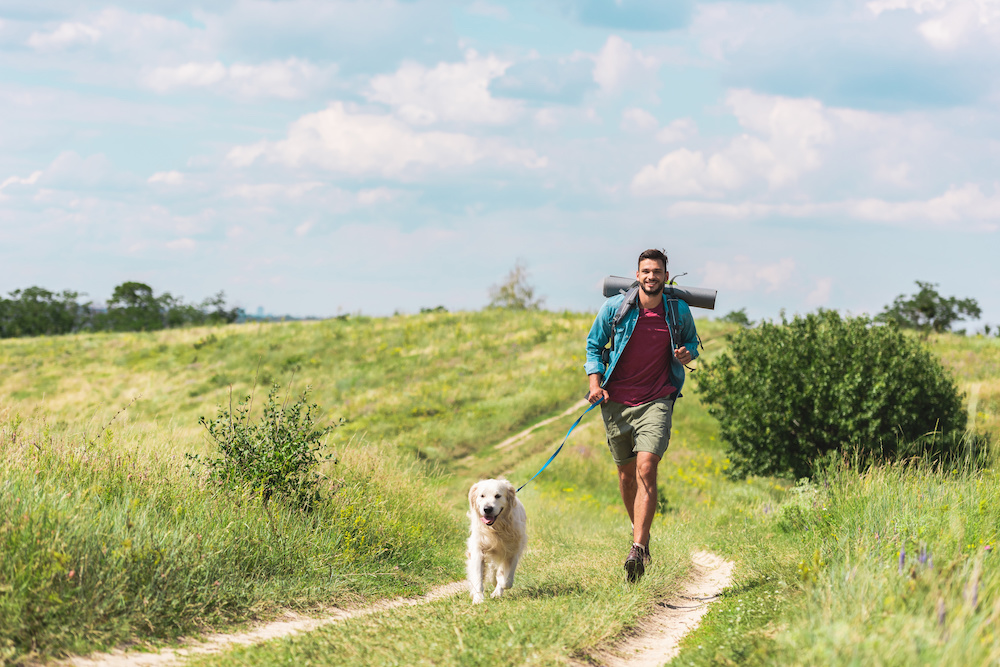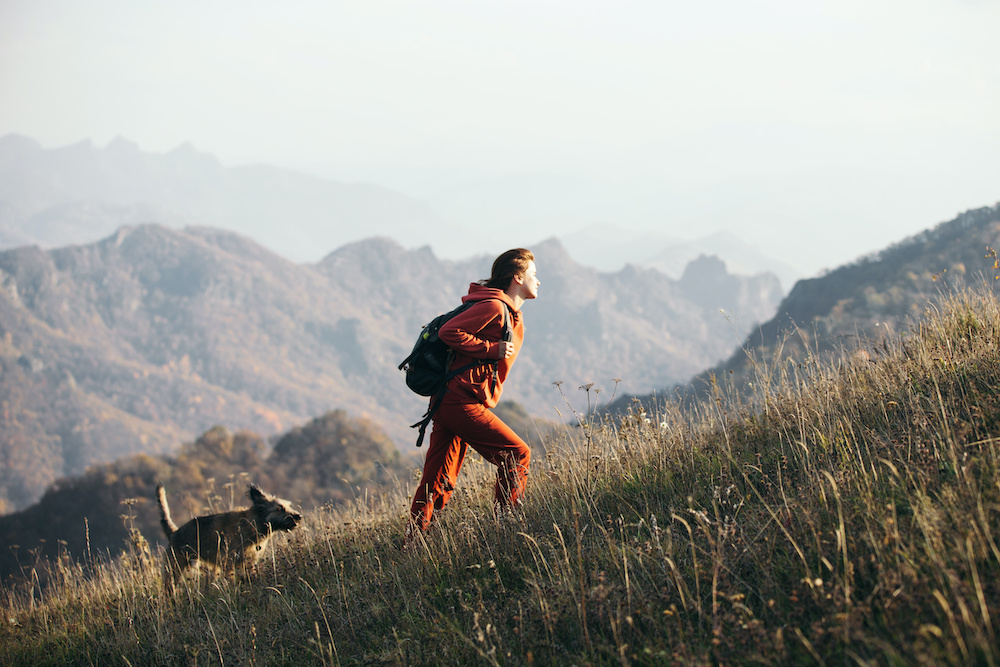
You don’t have to be with people when hiking because there are dogs that are more than willing to join you on your adventure.
Not every dog is suited for hiking, though, so if you are thinking of bringing your chihuahua on the trip, it will only be a burden.
Hence, let's talk about the best dogs for hiking to ensure you bring the right breed when you hike.
Best Dogs for Hiking: Our Top Picks
Although we will mention a few dog breeds that are perfect for hiking, it doesn’t mean that all of them will have a good time on the trail.
It also doesn't mean that they're the only best dog breeds for hiking.
That said, the best trail dogs should be very active and adventurous and have the energy to go around.
They should also have the right type of body to withstand the strength needed for the activity.
The list below is just a guide, and their ability to be a hiking dog depends on how they are raised and trained.
1. Labrador Retrievers
This breed is one of the best dogs that you can bring on the trail. It loves to go on adventures and has a body that can handle the trail's rough terrain.
As for their attitude, most Labrador retrievers are well-behaved, so they won’t mischief during the trip. Still, it is better if you have a well-trained Labrador retriever.
You might encounter other hikers with their dogs, so it is better if you can control yours if it sees another dog on the trail.
2. Beagle
Beagles are energetic dogs. Even with their small stature, their body is very strong and tough, which makes them a great hiking companion.
Beagles are also known for their friendliness, so you won’t have any issues if you encounter other hikers and dogs on the trail.
Although they would definitely chase small critters on the path, their large voice would easily scare them away.
3. Bernese Mountain Dog
This dog breed is very comfortable in colder climates, so it is better to bring it on cold or winter hikes.
The Bernese mountain dog came from Switzerland and worked as a cattle herd and watchdog.
It is a bit bigger than some of the best hiking dogs, which gives it an edge when hiking.
This dog breed's body can withstand even the toughest trails. It's also very happy and calm, but you can train it to be a bit more aggressive, especially if you want it to protect your house.
4. German Shorthaired Pointer
This dog breed has a wiry frame and short hair. It is highly favored in the hunting community, but it is not the only thing it can do.
If you prefer to hike in sunny and warm areas, the German shorthaired pointer might just be the companion you are looking for for a long time.
5. Siberian Husky
This dog breed is very big with a thick coat, making it perfect for cold hikes.
You can also bring it in different weather conditions, as long as the weather isn't too hot.
This type of dog is also always full of energy and can even beat you on longer hikes.
6. Australian Shepherd
You don’t have to worry because your Australian shepherd will surely love the trail.
Just bring a leash with you because it will surely leave you in the dust once you start hiking.
This dog breed has an adventurous nature and is always full of energy, making it one of the best trail dogs for hiking.
That said, the top reason why this dog is the best for hiking is its ability to withstand hot and cold temperatures.
As such, you can bring your Australian shepherd on any trail that you plan to take.
7. Rhodesian Ridgeback
The Rhodesian ridgeback came from Zimbabwe, a place in South Africa.
It's actually bred to hunt on the plains of Africa, so just imagine this dog running around hunting alongside lions, crocodiles, and more.
From that alone, you can already see how tough this type of dog is. Its tough body can surely withstand the rough terrain of the trail.
It's not as energetic as herding dogs, but it's perfect for moderate to difficult hikes.

8. Dalmatians
Dalmatians are well-loved around the globe, especially after the 101 Dalmatians movie in 1996.
This breed of dog is friendly and full of energy and has a tough body, even if it's on the lean side.
Hiking is a great way for dalmatians to release their energy.
The best thing about them is they don’t have an insane prey drive, so you cannot expect them to run after every critter on the trail.
You can bring them on cold hikes, but you need to make sure that they have enough protection.
9. Alaskan Malamute
The Alaskan malamute is one of the best dog breeds for hiking because of its ability to walk and explore for many miles a day.
You are probably tired already, but this dog is still full of energy at the end of the day.
There is also a tendency that it would pull away and take the lead, but you can prevent this through positive training.
Unlike Siberian huskies, malamutes are not friendly with other dogs, but you won't have a problem with it if there are other hikers on the trail.
10. Plott
Plott is a rare breed since they were bred to hunt wild boars and large animals.
It has the best endurance compared to the dogs on this list, and it loves to run long distances.
That is one of the reasons why it's a great hiking companion.
The only drawback is this breed's prey drive since it would lunge after critters and birds at the sight of them.
FAQs About Hiking With Dogs
Do Dogs Like Hiking?
There are a lot of dogs seemingly made for the trail. Most of them are dogs often used to hunt in the wild.
Some dog breeds love adventure, so they are the perfect choice if you want to go on a hike with a pet.
How Many Miles Can a Dog Hike?
It would depend on the breed since there are dogs capable of recording more than 15 miles a day.
But, an average dog can hike happily for about five to 10 miles a day.
Dogs won’t be able to keep this up if you are going to hike for several days.
Your dog's age will have a big impact on how far he or she can go during a hike.
Dogs that are one-year-old and above can cover more miles than dogs that are too young or too old.
Do Dogs Need Shoes for Hiking?
Most of you would say no since wearing shoes or boots may hinder their feet's natural movement.
However, you need to consider the protection of your dog’s feet, especially if you are going to hike for several miles.
There are hiking shoes for dogs that would protect their paws on long hikes.
It would be a type of shield for their paw pads against sticks, rocks, thorns, and other pointy things on the ground.
Wearing hiking boots can also reduce cracking and blistering on their feet.
How Do I Protect My Dogs Paws When Hiking?
Aside from hiking shoes, there are other things that you can do to prepare your dogs for a long hike.
Paw protection wax can be an excellent way to protect their paws.
You can let them walk on their feet for a few miles, but you can let them wear hiking shoes when the terrain starts changing.
How Do I Start Hiking With My Dog?
The first thing you need to do is ask your vet if your dog is capable of hiking.
You have to remember that even if your dog's breed is one of the ones mentioned above, it doesn’t mean that you can bring them to the trail.
The best dogs for hiking are the ones who are healthy enough to withstand the tough trail.
Your vet will tell you if your dog is good enough for hiking and what you need to do to prepare them.
You should also ensure that you've the necessary items your dog would need during the hike.
Apart from shoes, make sure you have the right type of leash and collar; not too tight and not too loose.
Lastly, as noted earlier, make sure you trained them well and prepared their body for such physical activity.
Bringing Your Dog During Your Hike
It’s always great to have friends or relatives on the trail, but if you want to be alone, you can just bring your dog with you.
The best hiking dogs can give you the extra boost you need during the hike and make your solo trip more fun and exciting.
Still, take note of your dogs' health and don’t bring the smaller, home dogs on the trail since they will only be a burden to you.
Plus, you're putting them at risk of being sick, or worst, developing fears and anxiety because of their hiking experience.
